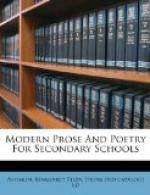It is a very dramatic form for the story. One almost wishes it were true. How fine a unity it would give our epic! But perhaps, after all, the real truth is more interesting. The life of the nation cannot be reduced to these so simple terms. These two great forces, of the North and of the South, unquestionably existed,—were unquestionably projected in their operation out upon the great plane of the continent, there to combine or repel, as circumstances might determine. But the people that went out from the North were not an unmixed people; they came from the great Middle States as well as from New England. Their transplantation into the West was no more a reproduction of New England or New York or Pennsylvania or New Jersey than Massachusetts was a reproduction of old England, or New Netherland a reproduction of Holland. The Southern people, too, whom they met by the western rivers and upon the open prairies, were transformed, as they themselves were, by the rough fortunes of the frontier. A mixture of peoples, a modification of mind and habit, a new round of experiment and adjustment amidst the novel life of the baked and untilled plain, and the far valleys with the virgin forests still thick upon them: a new temper, a new spirit of adventure, a new impatience of restraint, a new license of life,—these are the characteristic notes and measures of the time when the nation spread itself at large upon the continent, and was transformed from a group of colonies into a family of States.




